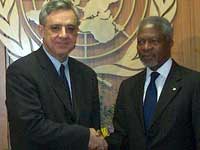
 On 25 September 2006 Foreign Minister of the
On 25 September 2006 Foreign Minister of the
Below is the text of the speech
“Madame President,
It is a pleasure to congratulate you and to wish you a year that is relatively free of crises and catastrophes. In other words, a year not like the one we?ve just had during which my good friend Ian Eliasson successfully navigated through troubled waters.
The year of turmoil, as he called it, included conflicts, as well as man-made and natural disasters that required our collective response. These challenges to our united will are becoming more numerous, more dangerous and more complex.
Of all the events last year, the one which stood out most tragically was the war in
In other areas, a united international community has succeeded. It has played a supportive role in the civilized process which brought
The most insipid and threatening challenges in the world remain those of poverty and hopelessness. When the world's leaders met six years ago, they decided that the UN was the ideal mechanism to confront the social ills facing our societies, they publicly accepted their combined responsibility in achieving accelerated and more even social and economic development. They said to the world that, together, we will channel international processes and multinational resources to tackle the most basic human needs. Thus, they placed the principle and potential of united action on the judgment block. Six years later, the world continues to watch in earnest to see if individual and regional interests can be rallied in striving for the common good.
Madame President,
We are faced with the same challenges, locally. In
Encouraged by our own successes, this year we have determined to build on our course of economic recovery and target rural poverty. We are reminded of the remarkable promise made to the victims of global poverty in 2000: “To free our fellow men, women and children from the abject and dehumanizing conditions of extreme poverty.” To do this at home, we will leverage the philanthropy of international organizations and friendly governments with the traditional generosity of our Diaspora to build and repair infrastructure, which is essential to facilitate and enable economic development.
But infrastructure alone does not reduce poverty and remove unjust inequalities. Creating economic opportunities, teaching the necessary skills – these are essential to erase the deep development disparities that exist today between cities and rural areas.
Madame President, we will begin in our border communities, because unlike other countries, where borders are points of interaction and activity,
But with
Madame President, let me take a minute to reflect on Kosovo, as so many have done. We follow the Kosovo self-determination process very closely. We ourselves strongly support the process of self-determination for the population of Nagorno Karabakh. Yet, we don't draw parallels between these two or with any other conflicts. We believe that conflicts are all different and each must be decided on its own merits. While we do not look at the outcome of Kosovo as a precedent, on the other hand, a Kosovo decision cannot and should not result in the creation of obstacles to self-determination for others in order to pre-empt the accusation of precedence. Such a reverse reaction – to prevent or pre-empt others from achieving well-earned self-determination – is unacceptable.
Efforts to do just that – by elevating territorial integrity above all other principles – are already underway, especially in this chamber. But this contradicts the lessons of history. There is a reason that the Helsinki Final Act enshrines self-determination as an equal principle. In international relations, just as in human relations, there are no absolute rights. There are also responsibilities. A state must earn the right to lead and govern. States have the responsibility to protect their citizens. A people choose the government which represents them.
The people of Nagorno Karabakh chose long ago not to be represented by the government of
But the government of
In the most cynical expression of such irresponsibility, this last December, a decade after the fighting had stopped, they completed the final destruction and removal of thousands of massive hand-sculpted cross-stones – medieval Armenian tombstones elaborately carved and decorated.
Such destruction, in an area with no Armenians, at a distance from Nagorno Karabakh and any conflict areas, is a callous demonstration that
One cannot blame us for thinking that
But
The path that Nagorno Karabakh has chosen for itself over these two decades is irreversible. It succeeded in ensuring its self-defense, it proceeded to set up self-governance mechanisms, and it controls its borders and its economy. Formalizing this process is a necessary step toward stability in our region. Dismissing, as Azerbaijan does, all that?s happened in the last 20 years and petulantly insisting that things must return to the way they were, is not just unrealistic, but disingenuous.
Madame president, Nagorno Karabakh is not a cause. It is a place, an ancient place, a beautiful garden, with people who have earned the right to live in peace and without fear. We ask for nothing more. We expect nothing less.”
Source: http://www.armeniaforeignministry.com/
Photo: Oskanian meets Kofi Annan (archives)
